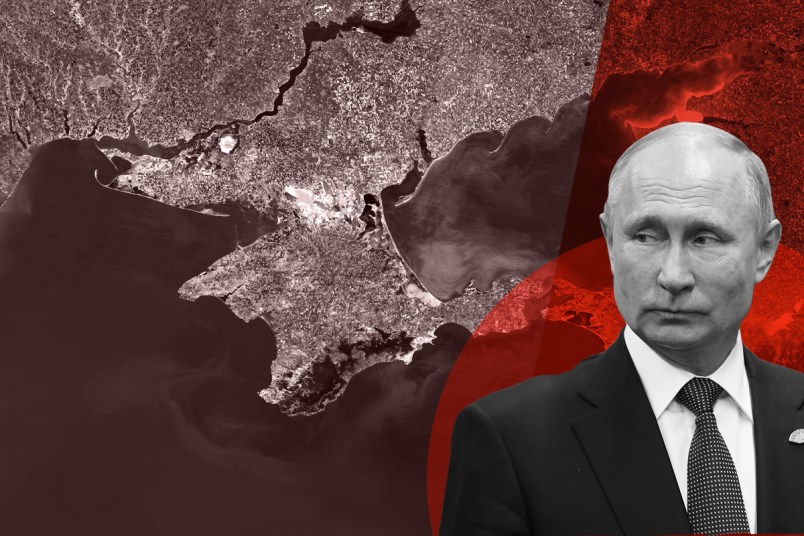In more peaceful times, Ukraine’s Black Sea coast is an economic hub, allowing the country to siphon off the fruits of its land in exchange for foreign cash, while drawing hordes of domestic and foreign tourists to the region’s beaches.
Now, that coast – and the contested Donbas region to the northeast – are in Russia’s crosshairs, as it intensifies its military campaign.
In the war’s early days, Russian forces advanced across a large swath of that territory. It contains the only large city – Kherson – that the Russians have managed to seize, giving the Kremlin a potentially big bargaining chip in any potential future negotiations around a settlement.
The gains point to a broader question that comes as a diplomatic resolution remains elusive: What will happen to Ukraine territory that Russia captures?
“Moscow will take whatever territory they control as a starting point with the presumption that they get to keep it and they will interpret the territory maximally, even though it’s my understanding that what Moscow may control in those red areas are a couple of large cities and the roads, not the whole area,” John Herbst, a former U.S. ambassador to Ukraine, told TPM.
It’s not clear that the conflict is anywhere near a diplomatic resolution, or if anything other than a military win is even within Russia’s current goals. But the disposition on the ground comes as questions persist about whether a political victory is even possible for Russia, even as the Russian advance seems to have halted outside Kyiv and Kharkiv, with Russian forces reportedly unable to push towards Odessa.
Stephen Kotkin, a professor of history and international affairs at Princeton University and author of a three-part biography of Josef Stalin, told a Hoover Institution podcast last week that Putin may be content with taking the Black Sea coast and leaving the rest “shattered.”
“What I fear is the outcome is, Putin says, well, I can’t have Ukraine? You can’t have it either. I’ll just break it,” Kotkin said. “I’ll keep the Black Sea littoral, that beautiful coastline, all the way through Odessa and that piece of Moldova known as Transnistria, and a little bit beyond, the Danubian delta, Dniepr delta, the land bridge to Crimea, all the way through to Eastern Ukraine.”
That outcome would render Ukraine landlocked.
“I fear that outcome, because he doesn’t need to reconstruct it, he doesn’t need to own it, he just needs to shatter it,” Kotkin added.
In 2014, Vladimir Putin spoke frequently of “Novorossiya,” a Tsarist-era term referring to the Black Sea coastal region and parts of eastern Ukraine.
Back then, it came as part of an effort to ignite a “Russian spring” – a nationalist, pro-Russian movement in the area that never quite took off.
“You’re looking at Novorossiya in red on the map,” Herbst, the former U.S. ambassador, told TPM, referring to the current extent of the Russian advance. “What Moscow has done is essentially establish its control of Novorossiya – they’ve got the land bridge to Crimea right now, and they’re moving beyond that, heading towards Odessa.”
Novorossiya vanished from Putin’s speeches in 2015. But it’s started to pop up here and there; Putin described its 18th-century creation as “underlain by the common faith, shared cultural traditions, and – I would like to emphasize it once again – language similarity,” of Ukrainians and Russians in a July 2021 essay which argued that Ukrainian nationhood was fictive. Oleg Tsaryov, a former Ukrainian MP who fled to Moscow in 2014 and served as speaker for the non-existent parliament of a 2015 attempt to create a “federal state of Novorossiya,” is back in Ukraine, calling for the country’s “denazification.”
Part of what makes discerning an outcome so murky is the complicated mixture of motives for the war itself. Is it reconstituting the Russian empire? Stopping NATO expansion from engulfing Ukraine? Asserting Russian ethnic dominance over a people it views as lesser?
Aaron David Miller, a senior fellow at the Carnegie Endowment for International Peace and a former negotiator with the State Department, told TPM that the Kremlin’s aspirations likely extended beyond gaining particular parts of Ukraine, though those could be used as bargaining chips in any future talks.
“Putin’s aim in Ukraine went much further than territorial acquisition,” Miller said. “It has a lot to do with redefining what he considers to be grossly unfair and aggrieved security architecture, and that involves not only a bilateral negotiation with Ukraine, but a more complex dance with the U.S., NATO, and certain members of the EU.”







Something, something about appeasement will not work with Putin. And if once appeased where and when will it end?
No appeasement. And for fucks sakes, give the Ukrainians those Polish jets.
Russia’s getting its ass kicked by a fictitious country.
Territorial acquisition is for winners and it doesn’t look like Pootie is winning.
Wait til supply shortages of western goods hit the Russian populace. Sucks to be you, Putie.